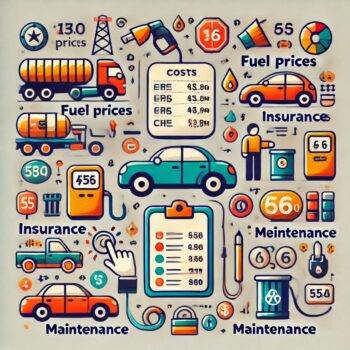
Owning a car in China can be a significant financial commitment, with costs ranging from the initial purchase to ongoing expenses like insurance, fuel, and maintenance.
Whether you’re a resident or an expat, understanding these costs is essential for making an informed decision.
This guide provides a detailed breakdown of car ownership expenses in China, along with tips, comparisons, and resources to help you plan effectively.
Initial Costs of Buying a Car in China
Owning a car in China starts with significant upfront expenses, including the vehicle’s price, taxes, and registration fees.
1. Car Prices
The price of a car in China varies widely depending on the brand, model, and whether it is locally manufactured or imported.
- Domestic cars: Brands like Geely, BYD, and Changan are more affordable, with prices starting at around 50,000 RMB ($7,000).
- Imported luxury cars: Brands like BMW, Mercedes-Benz, and Tesla can cost upwards of 500,000 RMB ($70,000).
Tip: Domestic brands like BYD are gaining popularity for their affordability and quality, especially in the electric vehicle (EV) market.
2. Taxes and Fees
When purchasing a car in China, you’ll need to account for several additional costs:
- Vehicle Purchase Tax (VPT): This tax is 10% of the car’s net price. For example, a car priced at 100,000 RMB will incur a 10,000 RMB tax.
- License Plate Fees: In cities like Shanghai and Beijing, license plates are auctioned to limit the number of vehicles on the road, costing up to 100,000 RMB. In smaller cities, the cost is much lower, typically between 500 RMB and 2,000 RMB. Check the Shanghai Vehicle Auction Website for more details.
- Registration Fees: These fees range from 300 RMB to 500 RMB.
3. Insurance Premiums
Car insurance is mandatory in China, with additional optional coverage available.
- Basic Insurance: Starts at around 1,000 RMB per year.
- Comprehensive Insurance: Costs between 5,000 and 10,000 RMB annually, depending on the car’s value and coverage.
Tip: Use platforms like Ping An Insurance or China Pacific Insurance to compare insurance plans.
4. Customization and Extras
Many car owners spend on customizations like window tinting, seat covers, or advanced GPS systems.
These can add another 2,000 to 10,000 RMB to the initial cost.
Ongoing Costs of Car Ownership in China
Once you’ve purchased a car, there are recurring expenses to consider.
1. Fuel Costs
Fuel prices in China are regulated and fluctuate based on international oil prices.
As of recent data:
- Petrol (92 octane): Approximately 8 RMB per liter.
- Petrol (95 octane): Around 8.5 RMB per liter.
For a typical car owner driving 1,500 kilometers per month, the monthly fuel expense is approximately 1,000 RMB.
You can check current fuel prices on China National Petroleum Corporation’s website.
2. Maintenance and Repairs
Regular maintenance is essential to keep your car in good condition.
- Basic Maintenance: Includes oil changes, filter replacements, and tire rotations, costing 300 to 800 RMB per visit.
- Major Repairs: For parts like brakes or the transmission, costs can range from 1,000 to 10,000 RMB.
- Annual Inspection Fees: Required for all vehicles, costing around 200 to 300 RMB.
Tip: Use authorized service centers for maintenance to ensure quality and avoid warranty issues.
3. Parking Costs
Parking fees can be a significant expense, especially in urban areas.
- Residential Parking: Monthly fees range from 200 to 1,000 RMB, depending on the location.
- Public Parking: Hourly rates range from 5 to 15 RMB, while daily rates in city centers can reach 100 RMB.
4. Tolls
China has an extensive toll road network. Frequent toll usage can add 500 to 1,500 RMB to monthly expenses for long-distance travelers.
Use apps like Gaode Maps to calculate toll costs for your route.
5. Depreciation
Cars in China depreciate quickly, especially domestic brands.
On average, a car loses 20-30% of its value in the first year and around 50% within five years.
Resale values depend on the car’s condition and market demand.
Electric Vehicles (EVs): A Cost-Effective Alternative
With the Chinese government promoting green energy, EVs are becoming increasingly popular.
While the initial purchase price of EVs like Tesla or NIO is comparable to traditional cars, they offer significant savings in the long term.
- Electricity Costs: Charging at home costs approximately 0.5 RMB per kWh, while public fast chargers cost around 1 RMB per kWh.
- Maintenance: EVs require less maintenance due to fewer moving parts.
- Subsidies and Exemptions: Many cities offer subsidies for EV purchases and waive license plate fees. For more information, visit the Ministry of Industry and Information Technology.
Tip: Apps like Teld can help you locate charging stations across China.
Hidden Costs of Car Ownership in China
1. Fines and Penalties
Traffic violations, such as running red lights or speeding, can result in fines ranging from 100 to 2,000 RMB.
Accumulating too many demerit points can lead to additional penalties.
2. Car Loans and Financing
Many car buyers in China opt for loans. Interest rates typically range from 4% to 6% per year, with loan terms of up to 5 years.
This adds significant interest costs over time.
3. Driver’s License Fees
If you don’t already have a driver’s license, obtaining one in China involves training programs and tests, costing 3,000 to 6,000 RMB.
For more details, visit the China Driver’s License Guide.
Alternatives to Car Ownership
For those who find car ownership too expensive or unnecessary, there are several alternatives:
- Public Transportation: China’s metro systems, buses, and high-speed trains are affordable and efficient.
- Car-Sharing Services: Platforms like Didi Chuxing offer car-sharing and ride-hailing options.
- Leasing: Leasing a car can be a cost-effective option for short-term needs.
Conclusion
Owning a car in China involves substantial upfront and ongoing costs, from the purchase price and taxes to fuel, insurance, and maintenance.
However, with careful planning and by exploring alternatives like EVs or public transportation, you can make an informed decision that suits your budget and lifestyle.
For more information on car ownership in China, visit resources like China Daily or Autohome.


